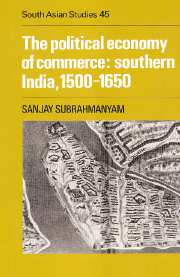Book contents
- Frontmatter
- Contents
- List of illustrations
- List of tables
- Preface
- Abbreviations used
- Introduction
- 1 The political economy of southern India, 1500–1650: preliminary remarks
- 2 Coastal trade and overland trade: complementarities and contradictions
- 3 Overseas trade, 1500–1570: traders, ports and networks
- 4 Overseas trade, 1570–1650: expansion and realignment
- 5 Europeans and Asians in an age of contained conflict
- 6 External commerce and political participation
- 7 Situating trade: models and methodological strategies
- Conclusion
- A note on currency and weights
- Glossary
- Note on sources
- Bibliography
- Index
- CAMBRIDGE SOUTH ASIAN STUDIES
- Frontmatter
- Contents
- List of illustrations
- List of tables
- Preface
- Abbreviations used
- Introduction
- 1 The political economy of southern India, 1500–1650: preliminary remarks
- 2 Coastal trade and overland trade: complementarities and contradictions
- 3 Overseas trade, 1500–1570: traders, ports and networks
- 4 Overseas trade, 1570–1650: expansion and realignment
- 5 Europeans and Asians in an age of contained conflict
- 6 External commerce and political participation
- 7 Situating trade: models and methodological strategies
- Conclusion
- A note on currency and weights
- Glossary
- Note on sources
- Bibliography
- Index
- CAMBRIDGE SOUTH ASIAN STUDIES
Summary
All history, it may be said, is comparative history, since the historian by using a vocabulary enmeshes himself instantly with other contexts in which the same vocabulary has been used. It is merely that some historians approach this question with a greater degree of self-consciousness than others; Frank Perlin, whose writings reflect an attempt to grapple with many of these problems, concludes one of his essays by noting that ‘the only means available to us for reexamining the problem of transition in the early modern period … [are] on the one hand, comparison, and on the other, an open frontier of relevance, which is to say the ruthless pursuit of the discipline of context’. However, as a ‘colonised’ historiography, one largely conducted in a language which is itself a product of the colonial episode, and frequently called upon to ‘justify’ itself in the terms of other historiographies, the body of writing on Indian historical problems has usually found itself in the position of an arena where ideas and models derived from other – usually European, more recently African – contexts are ‘applied’ willy-nilly. In this, it is not unique: much the same can be said of another ’colonised’ historiography, that on south-east Asia.
At the same time, practitioners of history are uneasily aware, while dealing with south and sout-east Asia in the period after 1500, that the process of parallel comparisons with western Europe in the period is well-nigh absurd, and can only bring forth the same dichotomies of success/failure, whether cast in terms of mentalities, material conditions, state policies, or – as has been more recently the case – a reversion from the parallel to the mirror-image, and hence the recourse to core-periphery interaction models.
- Type
- Chapter
- Information
- The Political Economy of Commerce: Southern India 1500–1650 , pp. 366 - 370Publisher: Cambridge University PressPrint publication year: 1990
- 3
- Cited by

